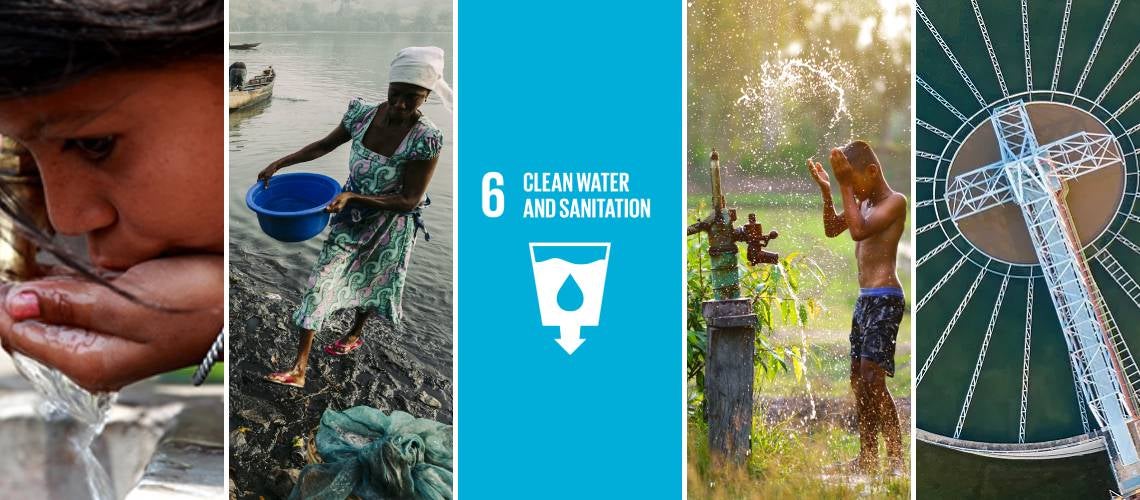 Water topics that dominated World Bank Water's Twitter posts in 2022.
Water topics that dominated World Bank Water's Twitter posts in 2022.
2022 was a year of important milestones for World Bank Water, with continued water investments across the world and new, impactful research and knowledge products. But events during the year also reinforced the urgent need to tackle the growing water crisis, exacerbated by climate change and conflict. Extreme floods and droughts and increasing pollution affected populations, industries, and ecosystems. At the same time, war in Ukraine is placing further stresses on fragile, water-scarce areas, such as Yemen and the Sahel.
The @WorldBankWater Twitter community is a diverse, knowledgeable group (we even have a couple of celebrity followers!) who are well aware of the daunting challenges in the water sector. We want to thank you for always bringing thoughtful and compelling discussions to the platform, as we work together to achieve a water-secure world for all.
Here are @WorldBankWater’s most popular tweets of 2022:
At the top of the list is a simple reminder of the actions we can all do to become more environmentally responsible. This tweet itself is a “top ten list,” and coming in at number one? Save water.
Water is the common thread connecting almost all the sustainable development goals. And new approaches to water challenges have the potential to effectively address several of the goals simultaneously, including health, food security, gender equality, and the environment. It’s not a surprise that SDG 6, ensuring access to water and sanitation for all, is a top priority for our Twitter followers.
Collecting water is a task that falls largely to women and girls around the world, and these gender divisions have broader implications for social equality and well-being. Without safely managed water, sanitation and hygiene (WASH) services, women and girls are more vulnerable to abuse, attack, and ill-health, affecting their ability to study, work and live in dignity. Our Twitter community showed strong support for this International Women's Day message.
Wastewater treatment and reuse has the potential to transform sanitation from a costly service to one that is self-sustaining and adds value to the economy. The World Bank’s #Waste2Resource initiative, which promotes resource recovery from wastewater facilities in the form of energy, reusable water, biosolids, and nutrients, remains a popular topic among the @WorldBankWater community.
Despite significant gains, the world is not on track to meet the SDG target for safe drinking water. In October, The State of the World’s Drinking Water, a joint report from the World Bank, the World Health Organization, and UNICEF was released, with an urgent call to action for governments to invest strategically in building safe drinking water systems.
World Water Day, held annually on March 22, raises awareness of the 2 billion people living without access to safe water. Our Twitter followers made their voices heard to celebrate this valuable resource and draw attention to the global water crisis.
“Water is the most essential human need and is critical for development, growth, and resilience,”
wrote World Bank President David Malpass and President Macky Sall of Senegal, on the eve of this year’s World Water Forum, held in Dakar in March. Yet one-quarter of the world’s population still lacks safe water and half lack safe sanitation. Their op-ed was shared widely among our Twitter community.
Achieving a water-secure world requires bold policy actions and investments at all levels But this starts with understanding how we value and manage this scarce resource – the theme of World Water Week 2022. At the conference in Stockholm, World Bank Water Global Director Saroj Jha called for improved governance and increased investment to tackle challenges in the sector.
Closing out our list are two tweets on groundwater, the focus of this year’s World Water Day and a prominent topic on @WorldBankWater. This invisible resource accounts for 97 percent of the world’s freshwater, but is threatened by overexploitation and pollution. Seeing the Invisible: A Strategic Report on Groundwater Quality, a flagship report supported by Global Water Security and Sanitation Partnership to mark World Water Day, examines the threat of contamination and calls for urgent actions and investments to protect groundwater quality.
Groundwater management, sustainability, and inclusion were among many topics that resonated with our Twitter followers in 2022. The focus on these themes will culminate in March, at the UN 2023 Water Conference, where representatives from public, private, and civil society will gather to emphasize the need for accelerated progress towards achieving SDG6. This conference aims to produce clear commitments, pledges and actions, which will be compiled in the Water Action Agenda. We look forward to continuing the conversation as we work together towards this important goal.


Join the Conversation